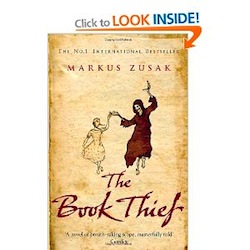 Published: 2005
Published: 2005
Author: Markus Zusak
A beautiful, heart-wrenching tale about the power of words
When I was planning the first meeting of #BookTwub, the new Twitter based book club, I knew I wanted a novel that was powerful, popular and would appeal to a wide audience. It seemed obvious to me fairly quickly that The Book Thief was the perfect choice. When I first read it a few years ago I fell in love with it and its position at number 3 on World Book Night’s Top 100 confirmed my suspicion that lots of other people also loved it.
Written by Australian Markus Zusak, The Book Thief is the story of nine-year old Liesel Meminger who is fostered by the Hubermann family in Molching, Germany in the late 1930s. The tale begins with the death of Liesel’s younger brother and Liesel, who is illiterate at this point, stealing her first book. As the months go by Liesel steals more books and these become her salvation as World War II erupts around her home on Himmel Street and danger is brought to her own basement by the Hubermanns’ decision to hide a young Jewish man from the Nazis.
The first thing that impressed me about this book was the decision to make the narrator Death. This isn’t the cruel, chilling Death that we would normally expect to see in fiction – in this story he is a kind, compassionate friend who arrives to ease the suffering of humans. Death encounters Liesel four times and becomes fascinated by the child and wants to tell us her story. It’s always enticing when someone says that they want to share a character’s journey with you. I know it’s just a novelist’s clever technique but it works well and I did want to know more about Liesel and the people that she encounters.
The characters in The Book Thief are beautifully crafted and developed. I can’t think of a single weak one, not even among the minor players. All are fully fleshed out and real, even if they play an incidental role in the plot. The main characters are all so different, recognisable and I cared about them immensely. Liesel is appealing – mischievous and high-spirited without being brattish. Hans Hubermann is decent, kind and willing to defend innocents against tyranny. He reminds me a bit of my favourite literary character Atticus Finch and I can’t think of higher praise than that. Liesel’s foster mother Rosa brings us both humour and the early and innocent danger in Liesel’s life. A large lady with a foul mouth she instills fear in poor Liesel but we know she’s a good and kind person under all her bluster.
I love the idea that words can save us. As an avid reader I know the power of the written word to move us but The Book Thief takes the concept much further. Both metaphorically and literally, words save Liesel’s life and to me that notion is incredibly attractive. So often, even if literature, the written word isn’t celebrated – instead it is used as a way to celebrate other art forms. I like that The Book Thief is an unapologetic fan of the power of words.
Of course, being set in Germany in the 1930s the treatment of Jews could not be ignored. I’m lucky enough to know and have worked with a number of survivors of the Holocaust and through hearing their stories I started to think for the first time about what “ordinary” Germans did during the war. How they supported or resisted Nazism, if they saw what was happening around them and how they reacted to it. These questions are tackled and we see a range of attitudes from Frau Diller, the enthusiastic Nazi to Hans Hubermann who risks his life to offer consolation and a little bread to an elderly Jew being marched to Dachau.
The Book Thief is an extraordinary work of fiction. It has characters worth caring about, it speaks to us about the power of the written word and the need to help those weaker than ourselves. It is one of the few books released in the past few years that truly deserves to be called a classic.

